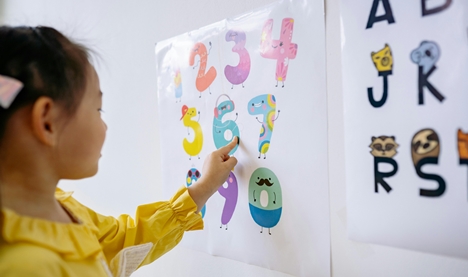
Mathematics in Kindergarten - Building Foundational Skills Through Play and Exploration
Mathematics in kindergarten is much more than numbers and equations; it is about nurturing a sense of curiosity and discovery in young learners. At this age, children’s natural inclination to explore their environment and solve problems is the perfect foundation for introducing basic mathematical concepts. Using play-based methods and creative exploration, educators can ensure that children develop essential math skills in a fun and engaging way.
This article discusses the role of mathematics in early childhood education, the importance of foundational skills, and how lessons and practice can be designed for young learners.
The Role of Mathematics in Kindergarten
Early exposure to mathematics is crucial for cognitive development, as it helps children make sense of the world around them. Simple concepts like counting objects, recognising shapes, and understanding patterns lay the groundwork for more advanced mathematical thinking in later years.
Math lessons in kindergarten are often integrated with storytelling, games, and hands-on activities, ensuring that children do not view mathematics as a rigid subject. For instance, asking children to count the number of fruits during snack time or identifying geometric shapes in everyday objects makes learning natural and enjoyable.
Building Foundational Math Skills
The foundation of kindergarten mathematics revolves around concepts such as number sense, spatial awareness, and logical thinking.
Number Sense
Number sense is the ability to understand and work with numbers. Activities like counting blocks, sorting objects by quantity, or identifying numerals on a number line help children build this critical skill.
Spatial Awareness
Understanding space and position is a vital skill that develops through activities like assembling puzzles, recognising shapes, or building structures with blocks. These activities teach concepts such as size, symmetry, and positioning.
Logical Thinking
Problem-solving and logical reasoning are introduced through pattern recognition, sequencing, and simple classification tasks. For example, children might be asked to arrange coloured beads in a repeating pattern or group similar objects together.
Math Lessons for Kindergarten
Kindergarten math lessons are designed to blend learning with play. Teachers use a variety of methods to introduce concepts, ensuring that children remain engaged and interested.
Interactive Storytelling
Math concepts can be woven into stories to make them relatable. For instance, a story about a farmer distributing apples among animals introduces addition and subtraction in a context that children can visualise.
Games and Activities
Games like hopscotch, dice rolling, or matching cards introduce counting and basic arithmetic. Similarly, board games with numbered spaces allow children to practice one-to-one correspondence while having fun.
Art and Craft
Craft activities, such as making paper collages of shapes or counting beads to create necklaces, reinforce spatial awareness and counting skills. These tasks also improve fine motor coordination.
Encouraging Math Practice Through Play
Reinforcing math skills outside the classroom is just as important as structured lessons. Parents and caregivers can play an active role in encouraging practice through everyday interactions.
For example, grocery shopping provides opportunities to count items, compare prices, and discuss quantities. Simple tasks like setting the table, where children count plates or arrange cutlery, can also be transformed into fun math exercises.
Using digital tools like math-based apps and interactive games is another way to make practice enjoyable. However, it is essential to balance screen time with physical, hands-on activities.
A Glimpse of Kindergarten Math Skills
The table below summarises the primary math skills developed in kindergarten and the corresponding activities that help achieve them:
|
Math Skill |
Activity |
|
Counting |
Counting toys, steps, or objects in nature |
|
Shape Recognition |
Identifying shapes in picture books or building blocks |
|
Pattern Recognition |
Creating patterns with beads, crayons, or coloured tiles |
|
Measurement Concepts |
Comparing lengths using ribbons or stacking objects |
|
Sorting and Classification |
Grouping objects by colour, size, or type |
The Importance of Play and Exploration
Play is the language of children, and incorporating mathematics into play ensures a stress-free learning experience. Through exploration, children develop the confidence to experiment with numbers and concepts. Whether it is through free play with building blocks or structured games like counting stars on a board, every activity contributes to their mathematical journey.
Exploration also fosters curiosity, which is a powerful driver of learning. When children discover mathematical patterns or solve puzzles, they experience a sense of achievement that motivates them to engage further.
Mathematics in kindergarten is about more than learning numbers; it is about fostering an environment where curiosity and play lead to discovery. By building foundational skills through hands-on activities, storytelling, and games, children develop a love for mathematics that stays with them throughout their academic journey.
When educators and caregivers prioritise exploration and practical applications, they ensure that mathematics becomes an integral and enjoyable part of a child’s early learning experience.
 (1).png)